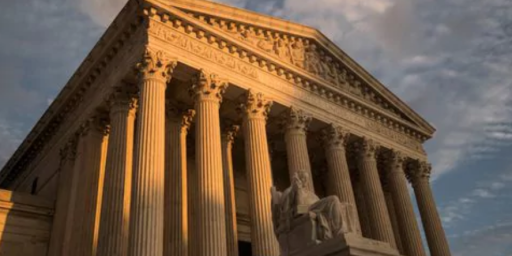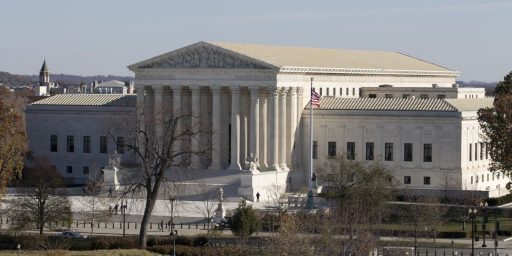The Only Thing I Love More Than Money Is Other People’s Money
The Supreme Court unamimously ruled* today that that it does not violate the First Amendment for a State to require that its public-sector unions receive affirmative authorization from a nonmember before spending fees imposed on the nonmember for election-related purposes.
Under Washington’s Fair Campaign Practices Act (a 1992 ballot initiative), a union is allowed to collect “agency fees” from non-members equal to the full amount of dues paid by members. §760, the provision at issue, restricts how the union can use those fees:
A labor organization may not use agency shop fees paid by an individual who is not a member of the organization to make contributions or expendituresto influence an election or to operate a political committee, unless affirmatively authorized by the individual.
The Court explains that, in finding a First Amendment violation in this seemingly benign requirement, the Washington Supreme Court read too much into the Court’s earlier agency fee cases, finding a ceiling where only a floor had been constructed. Instead of reading the Supreme Court’s ruling expressly setting minimum requirements as the maximum allowed, the State Supreme Court should have realized that “unions have no constitutional entitlement to the fees of nonmember-employees.”
[I]t is undeniably unusual for a government agency to give a private entity the power, in essence, to tax government employees. As applied to agency-shop agreements with public-sector unions like respondent, §760 is simply a condition on the union’s exercise of this extraordinary power, prohibiting expenditure of a nonmember’s agency fees for election-related purposes unless the nonmember affirmatively consents. The notion that this modest limitation upon an extraordinary benefit violates the First Amendment is, to say the least, counterintuitive. Respondent concedes that Washington could have gone much further, restricting public-sector agency fees to the portion of union dues devoted to collective bargaining…. [W]e conclude that the far less restrictive limitation the voters of Washington placed on respondent’s authorization to exact money from government employees is of no greater constitutional concern.
If this seems a rather obvious result, it should. One of the early hallmarks of Chief Justice Roberts’ tenure has been a push toward agreement: Finding grounds, even if it means narrowing the scope of individual rulings, upon which to get as many Justices as possible to concur on a case. It’s interesting, but not terribly surprising, then that he joins in the concurrence here that, by carving out part the of the ruling that could arguably have been excluded without changing the result, made it possible for the ruling to be unanimous.
_______________
*All 9 Justices were in agreement on the First Amendment question. Breyer’s concurrence, joined by Chief Justice Roberts and Justice Alito, merely declines to join in the second part of the ruling, which they saw as unnecessarily addressing issues not properly raised at the lower court level. This is the part where Justice Scalia eviscerates the union’s absurd assertion that §760 represents a limitation on how the union spends “its” money merely because mechanism whereby it collects agency fees places that money in its “lawful possession”:
As applied to public-sector unions, §760 is not fairly described as a restriction on how the union can spend ‘its’ money; it is a condition placed upon the union’s extraordinary state entitlement to acquire and spend other people’s money.[Emphasis in the original.]
Possession, as they say, is 9/10ths of the law. How often people forget that that other 1/10th exists….





As I understand from an article I read this morning, the WA legislature has more or less mooted the decision. Earlier this year, it defined in law that political activism would not be considered to have come from agency fees. The USSC’s decision therefore has limited effect, applying only to those wronged under earlier legal definitions.
The article was incorrect. In fact, the Court’s opinion addresses this issue directly (FN1):